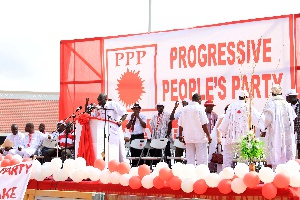Politics of Thursday, 3 March 2016
Source: classfmonline.com
Spare businesses 'killer' taxes - PPP
The Progressive People's Party (PPP) has said the government is killing local businesses with hefty taxes instead of spurring them on with tax incentives that will help them to grow.
The Joint Private Sector Business Consultative Forum, made up of the Ghana Union of Trader's Association (GUTA), Food and Beverages Importers Association of Ghana (FBIAG), Ghana Automobile Dealers Association (GADA), Ghana Institute of Freight Forwarders (GIFF), Customs Brokers Association of Ghana (CUBAG), and the Importers and Exporters Association of Ghana, went on a three-day strike recently in protest against the high taxes.
The PPP, in a statement signed by National Secretary Murtala Mohammed, said it was "saddened about the unfortunate sit-down strike" necessitated by the tax hikes. "These rampant increases in taxes and the imposition of taxes that have the potential of killing local industries and businesses by the NDC government are of utmost concern to us."
"It is the responsibility of government to ensure that local industries and businesses grow by creating the opportunity and making the economy 'business-friendly' for them. Tax incentives, protection against foreign firms, easy access to loans with low interest, restriction on importation of goods that can be manufactured locally are the mechanisms Government is expected to put in place to enable the growth and development of local industries.
"Instead Government has resorted to rampant increases in and haphazard imposition of taxes on local businesses and industries. This reckless decision on the part of Government has consigned some local businesses to economic scrapheap with no prospects," the PPP said.
The party has reminded the Government that the power crisis that "they plunged Ghana into resulted in the collapse of local businesses and industries, and loss of many jobs. The few ones that survived and are struggling to find their feet cannot be burdened with 'killer’ taxes. It is important to note that Government greeted Ghanaians at the beginning of 2016 with over 50% increase in utility tariffs and subsequently about 25% increase in petroleum prices".
"Amidst these increments, President John Mahama and his inconsiderate NDC government have imposed a 3% special levy on imports and also introduced the ECOWAS Common External Tariffs. Valued Added Tax (VAT) has been increased to 2.5% and insurance premiums to about 500%. We also understand that traders have to go through over 20 inspection institutions at the port before they can clear their goods.
"Is Government insensitive to its own people? Does Government only take delight in imposing of taxes on its citizens? This loathsome and heedless attitude of the NDC government must stop. In fact, this should not be happening in Ghana. Government must widen the net and look for proper ways of raising revenue rather than slamming of taxes on innocent citizens and local businesses. We need to apply proper procurement practices in order to save millions of cedis that we lose to corruption in this country.
"The Progressive People's Party commiserates with the Joint Private Sector Business Consultative Forum in this difficult time, and we wish to remind President Mahama and the NDC government that leadership is not about propaganda. Government must sit with the leadership of the Joint Private Sector Business Consultative Forum and listen to their concerns. Government cannot continue to kill local businesses," the PPP said.
The PPP is not the only group to speak against the high taxes. On Wednesday March 2, Nana Akufo-Addo’s running mate, Dr Mahamudu Bawumia, said the Mahama administration has "recklessly mismanaged" the economy to an extent that it is "desperately" resorting to "burdening" businesses and ordinary citizens with a plethora of taxes, which it sees as its only hope of getting out of a self-created mess.
Dr Bawumia, who says a future Akufo-Addo government will build the most people-friendly and most business-friendly economy, said Wednesday March 2, that: "The tax issue is a major issue because if you are so fixated on revenue, you'll essentially end up hurting your production. If you go back into history, [and] you study the economic history of the US, Germany, England, all of them have used the tax policy to encourage production."
"Today you have an unbelievable situation in Ghana where businesses are out on strike; businesses, which should be selling, are out on strike. Why are they on strike? Because they've been overburdened by taxes! And if you don't take care, you'd be chasing the tax revenue and killing businesses and when you kill businesses, it means you are causing unemployment and, so… this is why Nana Akufo-Addo is saying we need to mobilise financial resources. So, why are you going to be imposing VAT on financial services? It doesn't make sense in a country which has got a very large unbanked population and we want people to bank," Dr Bawumia told Kojo Yankson on Joy FM's Super Morning Show on Wednesday, adding that: "We'll abolish them. We will abolish import duties on all raw materials because that has been a policy that will help production."
The former deputy governor of the Bank of Ghana said it was important for the government to create an enabling environment through tax incentives to spur business growth, a situation that will, in turn, have a domino effect on job creation, and, thereby, get more people to pay income taxes while simultaneously serving as a shot in the arm to corporate tax earnings by the government, since businesses would have grown – by virtue of the tax incentives – to an extent that they could meet their tax obligations effortlessly.
"Let the businesses produce, let them make profit and when they make profit and employ people, we will get income taxes and we will get corporate taxes, so, you don’t go ahead to kill the businesses; no! Let them bring in the raw materials, let them produce, then you will tax at the end of the day and, so, [in] our approach – and this is why we're going to bring down corporate taxes – we’ll put incentives [in place] for real estates, tax incentives for the real estate sector, a special levy on imports, the 1 to 2 per cent, we'll abolish it and this is all to ginger up production and ginger up the economy."
In his view, the government's anxiousness to dig itself out of a self-dug hole has led to the Mahama administration adopting desperate measures such as higher taxes towards fixing a self-imposed problem, which, according to Dr Bawumia, rather keeps being counterproductive, thus spirally worsening the situation.
"I think that when you have a government where you have cutlasses being taxed, condoms being taxed, and even savings [being taxed] – there was a one per cent imposition on investments, which was later suspended – …to think about it, it just questions who are making these policies.
"When you become desperate, this is what happens; when you mismanage the economy into this hole, then anything sounds great to you because you don't have any option… and this is the problem, anything that is taxable, that can visibly be taxed, they are trying to impose taxes on it, including taxes on withholding and so on. All of these are hurting the economy, these taxes are hurting, and, therefore, you are not going to get the growth, and when you don't get the growth, you will not get the revenue, and when you don't get the revenue, you’ll go back to increasing taxes to get the revenue, and then you are in a cyclical downward spiral, and, so, they have it wrong, and we will change that particular policy. We will use the tax incentives to grow this economy and you will get the revenue. We reduced taxes on corporates from 32 to 25 per cent and we increased revenue, but because of this recklessness, they keep thinking that this is going to be the solutions: more taxes, more borrowing, more spending, which results in more taxes," Dr Bawumia said.
Just about a week ago, Pastor Mensa Otabil also expressed concerns about businesses being stifled with high taxes.
"For a nation to be great, its laws have to facilitate growth. You cannot overtax businesses and kill them and hope them to survive at the same time; it doesn’t work that way," the International Central Gospel Church (ICGC) founder told an audience of young entrepreneurs on Saturday February 27 in his keynote address at the grand finale of the Springboard road show organised by Albert and Comfort Ocran.
"If we want businesses to survive and to thrive, we have to create an environment for businesses to thrive," he said.
In his view, some of the most successful entrepreneurs and businesspeople in the world would have found it difficult to achieve the laurels they are currently famed for, had they found themselves in a stifling and “poisonous” atmosphere like Ghana’s.
"I asked this question some time ago on this same platform: If Mark Zuckerberg was a Ghanaian and had the idea of Facebook, would his idea have thrived? If Steve Jobs had the great idea of Apple and was a thriving computer engineer in Kokomlemle, would he have built that world class brand? I don't know. But it seems to me all of us are [in agreement] it would have been extraordinary for them to have succeeded. So, what's the difference between Mark Zuckerberg and you [audience], Steve Jobs and you? It's not brains, it's the Sulphur, it's the environment," he answered.
"That is why for most of you young men, don't just focus on your dreams, demand for the right environment to be created also, and the right environment is not NPP or NDC; parties don't govern nations, laws and policies govern nations. Go beyond party names and start examining policies and demanding policies that will make you thrive, so that if you want to set up a business, your business can thrive. Because if we don't do that we'll waste our talents, we'll waste our gift; we'll be world class but play at the village level. And it has nothing to do with your dreams or your talent; it has all to do with the environment. We have to force the politicians to think of us, and to think of our lives, and to think of our future, and to think of our dreams. And the only way to do that is for you to start thinking, not in party terms, but in policy terms and making sure that the laws that govern your industry favour you because if that doesn't happen, dreamers will die with their dream unrealised.











